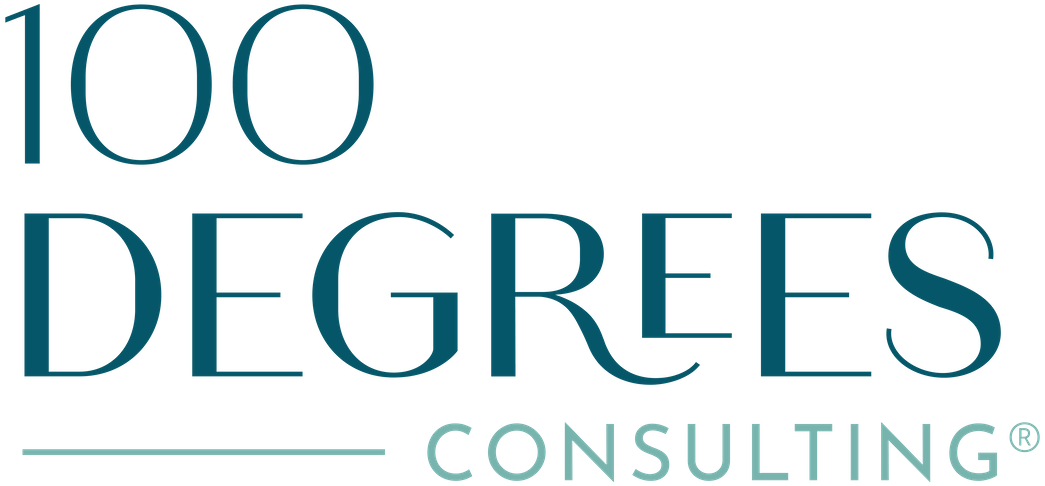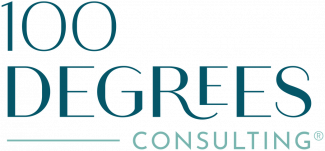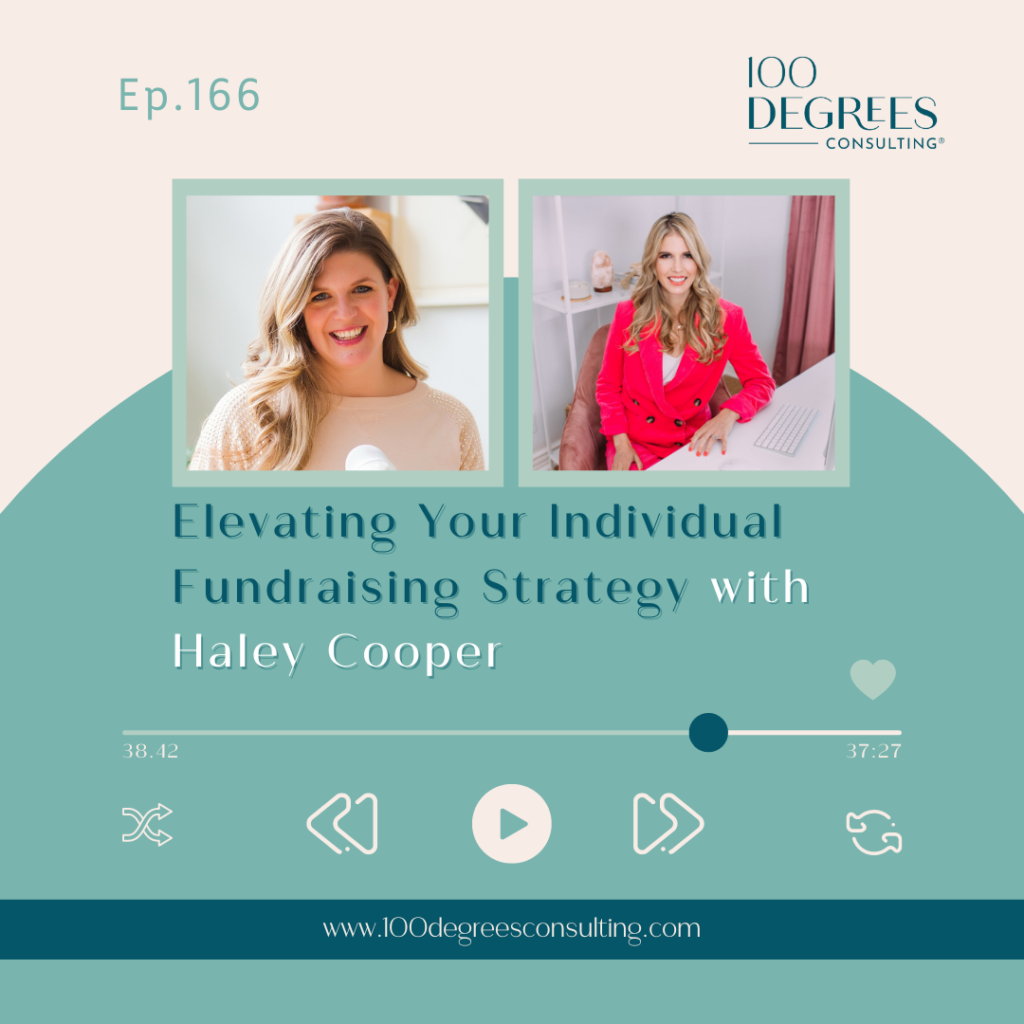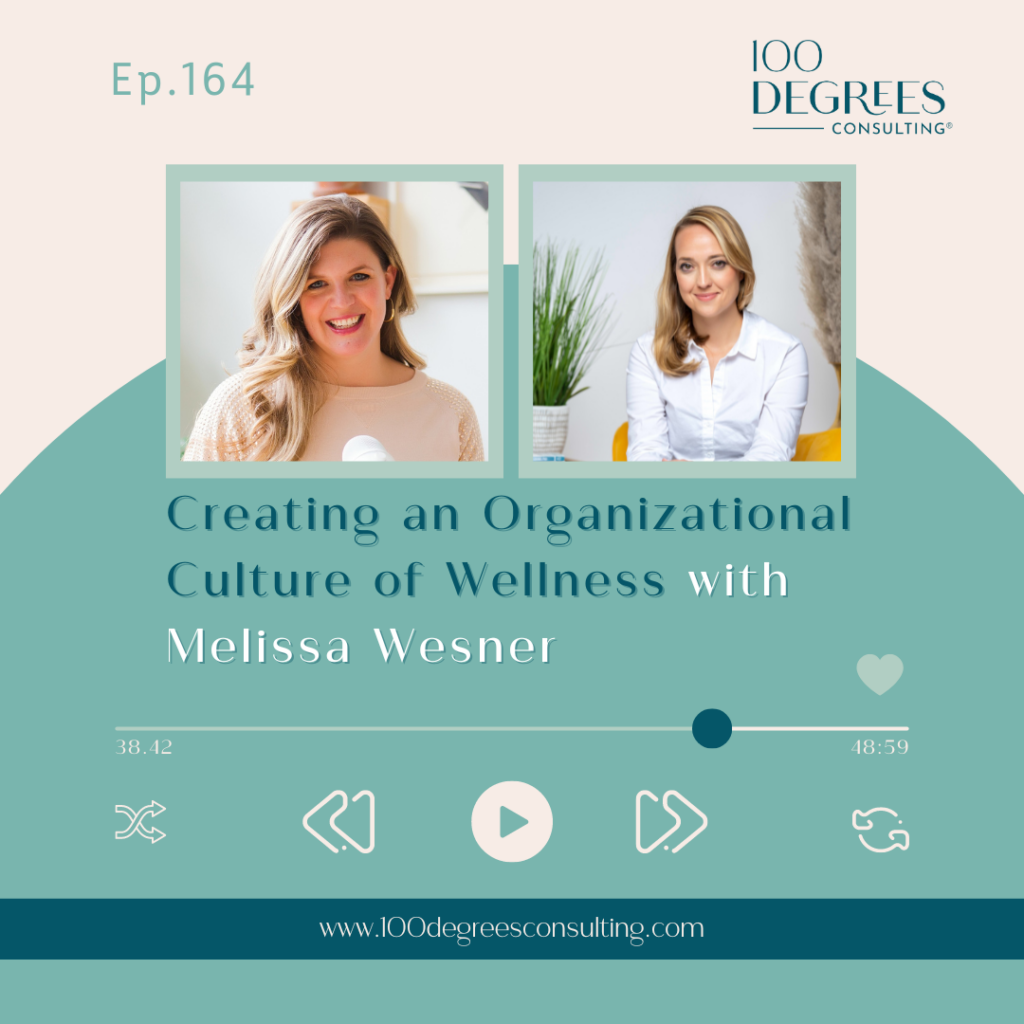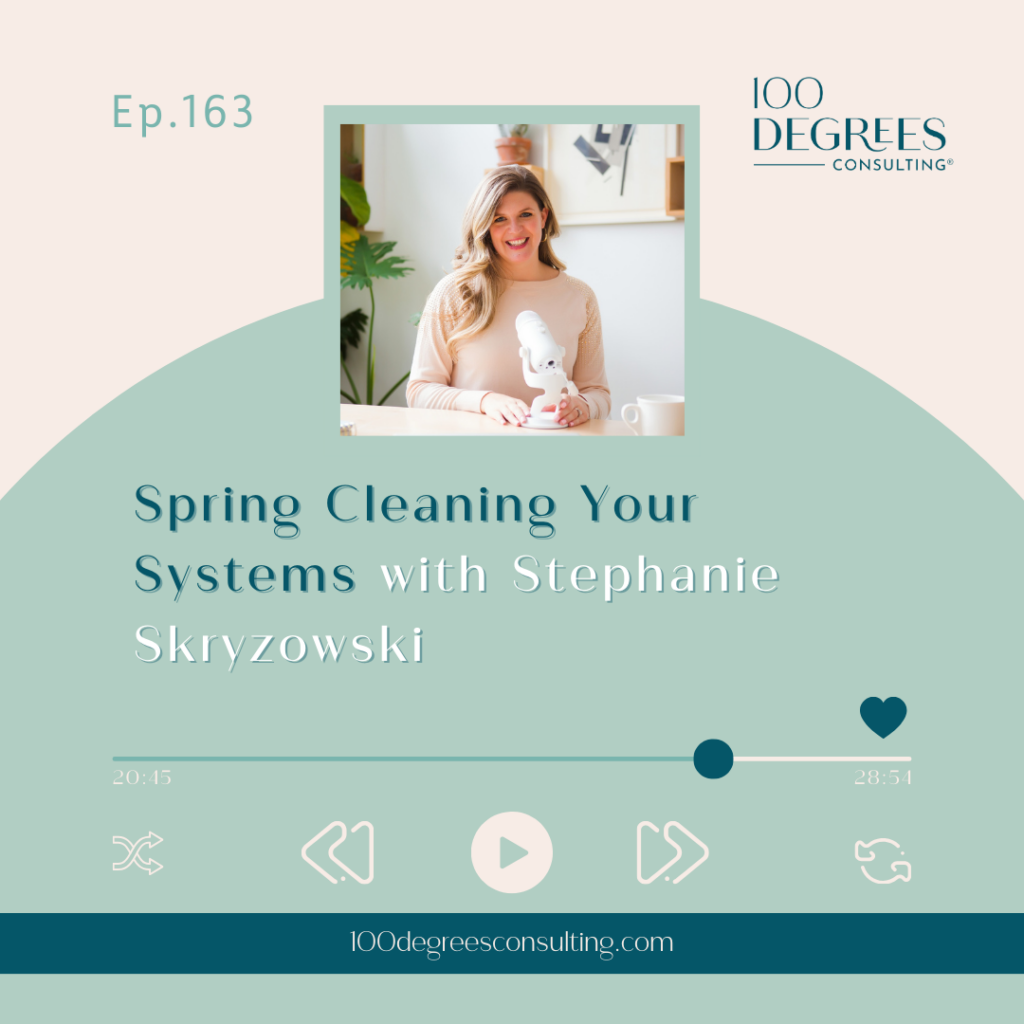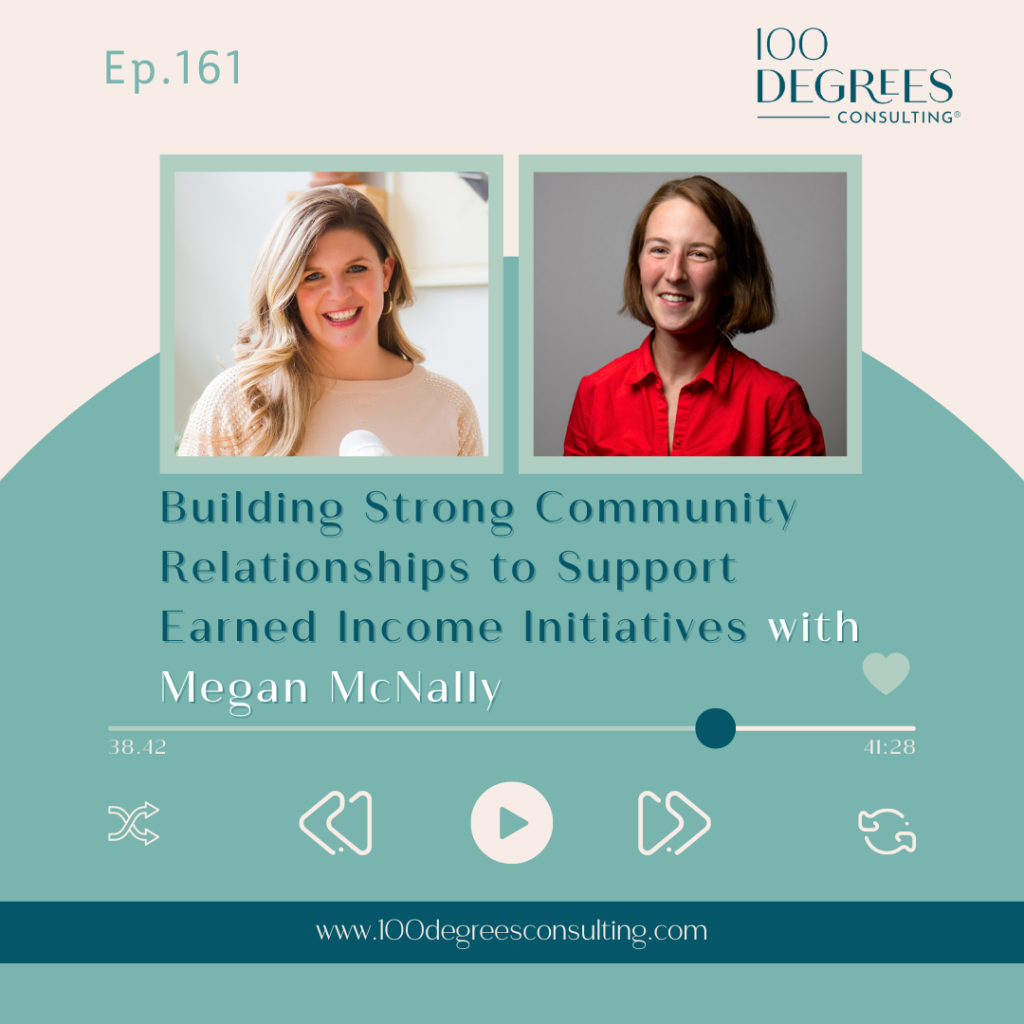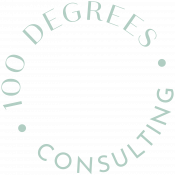Transcript Episode 80
Episode 80: Connecting Your Work to a Bigger Purpose with Suzi Howk
E80 – Suzi Howk
Stephanie: [00:00:00] Hey everybody. Welcome back to the show. I’m super excited today. We have a very special episode. Hopefully the one of, um, one of many special episodes, um, with one of our team members. So Susie, how is with me today? She is one of our CFO consultants and Susie’s been with 100 degrees for about five months now.
As a full-time employee and, um, I adore Susie. And so I invited everybody on my team, um, to join me on the podcast, you can learn a little bit more about them, but really what, um, what is interesting and important to them about the work that we do here at 100 degrees in our CFO and bookkeeping work and, um, and some lessons that she’s learned along the way.
Um, so I think this is a really interest. Episode four, you all just to hear from somebody new. So let me just quickly do Susie’s bio. So you know exactly who she is. Um, and then we can dive right in. So Susie has served nonprofits for 15 years and enjoys using her command of numbers to help make an impact.
She’s a passionate about finance and serving as a strategic [00:01:00] business partner. She believes organizations make. Better decisions by fully understanding their finances. She has extensive experience in grant contracting administration, employee benefits and organizational insurance. Susie held a bachelor’s degree in agricultural business from Iowa state university, and she lives in small town, Iowa with her two with her, I was gonna say with her husband and two children where she enjoys cooking, biking, and helping on the family.so I’m excited for you to talk to Susie today about her, um, her upbringing in, um, and where she lives in small town, Iowa, and how that connects to the work that she does here at 100 degrees. So hope you enjoy this episode. I’m excited to hear your feedback on it. Uh, and let’s dive in.
[00:00:00] And we can go ahead and get started. You ready? Yeah, let’s do this. Okay. All right. Hey everybody. Welcome back to 100 degrees of entrepreneurship. I am joined today by perhaps our most special guest yet. Uh, Susie H is one of the CFOs on the 100 degrees team. And I have Susie here on the show with me.
Welcome Susie. Hey, Stephanie, thanks for having me. And I’m super excited to talk to everybody. Yes. So this is the very first time that we’ve ever had anybody from our team on the show before. And I just thought it would be really, uh, like a fun series to kind of talk to different members of our team and learn about your background and your career path and what you do to help serve our clients and what you love about your work and maybe what you don’t love about your.
Can just kind of go a little bit more, um, yeah, a little bit deeper, because I think that our listeners hear a lot from me [00:01:00] about what it’s like to be a CFO, but, um, I think it’d be really interesting to hear from some other people as well. And, um, our team is, is awesome. So anyway, Susie, tell us, um, tell us a little bit about your like career path.
Have you always worked in, um, you know, in finance? What has that looked like for. Yeah. So, um, I guess my career in finance started when I was probably in middle school and I started, uh, getting really interested in business and numbers, finance and accounting. Um, I remember distinctly making up. Sales presentation to my parents, that they should, uh, do one thing rather than another
Um, my, my parents were in Amway growing up, if you, you know, were a, a child of the nineties. Um, so I was already surrounded by a business type culture. Uh, and I remember like being surrounded by that my parents were listening to tapes and videos about business. Entrepreneurship all the [00:02:00] time. So I was sort of in it from the beginning.
Um, yeah. And then I went to college, kind of dabbled around in international business, as well as, uh, I thought maybe I wanted to be a teacher for a while and decided that wasn’t a good thing. Um, and we ended up going into agricultural business. So I focused my degree in, um, Yeah, in business with an ag focus I’m from Iowa.
And so that makes a lot of sense for our area. Um, and then after college, I got involved in nonprofit, actually, an agricultural nonprofit, and spent about 15 years. At practical farmers of Iowa learning and growing with the business as the organization grew over time. Um, and it was great, cuz I got to work with farmers who are small business people as well as manage the finances of an organization.
So I’ve kind of got, I’ve got the entrepreneurship and non-profit as well. So yeah, that’s kind of where I started from and how I grew into. [00:03:00] that’s so cool. Um, I did not know the piece about your parents and the sort of entrepreneur as a kid kind of thing. Did you ever have any like little micro businesses as a kid?
Did you like sell stuff or anything like that? Walk dogs. Yeah. Yep. Um, my, we actually did farmer’s market and so I helped my dad grow and sell produce for farmer’s market. And then that branched off into things. Taking orders for pies and then distributing baking ’em and then distributing ’em I made pot holders at one point.
Um, yeah, I did a couple different international missions trip during high school. And so I’d make like money on the side to try and make, uh, the expenses for those international trips and yeah. Kind of entrepreneurship from the very beginning, I guess. Oh, that’s so cool. Um, I don’t think I knew that that side about the entrepreneurial, uh, the entrepreneurial starts.
Um, yeah, I was definitely the same way of, I think I’ve mentioned before on the podcasts. [00:04:00] Our listeners may know, but like I did all the things had the lemonade stands. I was just telling, um, our last guest, we were talking about our entrepreneurial ventures and. I used to make, um, I used to, like, we would go to once a year, we’d go to like the Jersey shore for vacation.
And so I would collect sea shells and I would paint the inside of the sea shells with nail Polish and then sell them as Ash tray, which is like, I feel like that is really dating me. This was like early nineties because. I mean, my parents didn’t even smoke. So it was like, but you know, people, the neighborhood did, it’s like here, come find my Ash tray.
I’m like, yeah. I don’t think kids are selling Ash trays anymore, but, um, yeah, that’s so funny. Um, that’s so cool. Okay. So you spent, um, so you spent 15 years at the nonprofit organization. Were you always like managing their finances or were you ever in any different roles there, any like program roles or anything like that, or just pretty much all finance.
So always [00:05:00] administration type focused. I didn’t spend any specific time in program. Um, but I will say when the organization was small, when I first started out, I ended up doing some programming, just cuz everybody wore all the different hats. Um, so the, the organization was about a million a year when I first started.
So I ended up doing some programming based on my interests. I ran the poultry program. I ran the youth program. I ran kind. On this side, but I started off as the, um, office manager and membership services coordinator. So lots of donor management, acknowledgements, um, that sort of office management type stuff, I guess, um, and did that for about nine months.
And then they realized, oh, she actually has a finance background. At that point, we were contracting out the finance services to another. Um, organization, not, not similar to a hundred degrees, but kind of the model that we handle right now. Um, and so [00:06:00] once I got in and kind of got my feet wet at the organization, they realized, oh, Susie can actually do this instead of paying a contractor to do it.
So at that point we brought the finances back in house. Um, and then I was doing office management and the finances, and then focus more and more on the finances and administration as the organization continued to grow. Yeah, that’s awesome. Um, and I see, you know, I see that with our clients and some former clients as well, like we really sort of look to whether they are outsourcing their finance function or whether they bring it in house.
Like when they bring it in house, we look at that as like a major milestone for the organization. Um, even though it’s like essentially putting us out. Job, you know, they’re, they leave us as a client. Like that’s a goal, right? Is that they can bring that finance function in house. And that was great that they were able to, um, yeah.
Able to kind of shift that over to you. So, um, I would love to hear, like, so you’ve been with [00:07:00] 100 degrees at this point for how long, when did you start with us? Uh, end of February, so let’s see. Okay. So like five months. Yep. Yeah. Oh my gosh. So how is it, you know, how is it working since you were the one organization for a really long time?
And now you’ve come into this new role where you’ve got, um, lots of different clients all at once. How is that? Was that like a, um, You know, sort of like, like a shock to your system or was it like a, kind of a fun new challenge? And you can say that it was a shock to your system if it was well, uh, both.
Can I answer it that way? Yeah. Um, yeah, so I will say it’s a shock to my system because it isn’t just one organization in the weeds all the time. Um, in the organization that I was in, I really under, I was sitting on the executive team as well as the leadership team. And so I was hearing all about the business all the time.
Um, really in depth on program, even though I wasn’t necessarily [00:08:00] involved in the program. So that’s been kind of a shock to not fully understand the programs of the organizations that I’m working with and how that impacts the finances. , but I will say it’s been really fun. Um, it’s really fun to get to work with lots of different people on lots of different things.
Um, so in one day I can work from, I can work with somebody in Malawi or not in Malawi, but working on stuff in Malawi to Texas, to Nicaragua, to, you know, California, to the east coast, like I’m getting so much more. Breadth of understanding of the work of nonprofits and what they’re doing. Um, not that it was bad to focus on one thing, but I’m really enjoying hearing and supporting lots of different organizations doing lots of really cool stuff.
Yeah. Yeah. I think like our work definitely lends itself to people that love [00:09:00] variety. Like you definitely won’t do the same thing. Over and over again. I mean, it’s interesting though, cuz our work is very cyclical, right? Like we have a monthly, like a monthly routine, a monthly bookkeeping, a monthly finance cycle that like we do the same thing month after month.
But at least I’ve found that one of the things that keeps me from not getting bored cuz I’m somebody that does. definitely get bored kind of easily. Mm-hmm is like that variety of clients that we work with. And in addition to like our monthly, the sort of monthly finance routine, there’s always like those other things, um, kind of popping up that keep things fresh and keep things new and whatever.
So, um, Yeah. Yeah. That’s really interesting. And I forgot you really. Your client portfolio is really global. I kind of forgot some of the clients that you’re working with, so you’re right. You’re, you’re all over the place. Um, yeah. How fun, what would you, it’s really fun to get to go ahead. I’m sorry. It’s really fun to get to, to work in different time zones.
[00:10:00] Um, that’s not something that I ever really had to experience with practical farmers of Iowa. Yes. Cause we were. Iowa based and all do in our own thing. Um, but it’s really fun to get, to, to talk to people in different states and across the globe and, um, work with yeah. Different time zones, even in the challenge that comes with that.
So it’s something new that I never thought that I would do. Yeah. Well, yeah, I can imagine, especially, cuz I, well, I don’t know exactly where you live in Iowa nor do I know a lot about Iowa, but I would imagine that there’s not like a whole, like a, a lot, a great number of, um, global nonprofit organizations in Iowa.
No, maybe I’m no, definitely not. Like, I don’t know. I don’t wanna make judgements on the sidewalk cause I’ve never been there before. I don’t know, but it would seem that there would not be a whole lot. Yeah. um, what would you say in, you know, in thinking about the work that we do, like clearly, you know, [00:11:00] I, I think a lot of people think about finance and accounting as like this boring thing that like.
You don’t wanna have to deal with, it’s just like a, you know, a sort of a nuisance, a necessity, you and I love it. Like it’s the work that we do. It’s the work that lights us up. But that doesn’t mean that we love every single minute or every single little task about what we do. Um, what would you say are like the tasks or the parts of the work that we do that you’re like, not a huge fan of, but maybe you just, you know, it’s gotta get done, but you’re not the biggest.
Yeah. Um, well, coding thousands and thousands of transactions is not necessarily fun. uh, yeah. Um, there is, there is some manual tasks like data entries specifically, or like double checking that a formula is, right. So the analysis comes across correctly. And why isn’t something tying, like, there are times where you’re just kind of.[00:12:00]
Like, this is really frustrating, but you know, at the end of the day that that work is worth it and it helps make decisions for people. Um, I, I love the number, part of it, um, because. I have always said that you can’t make good decisions unless you know your numbers and understand your numbers well, and you don’t necessarily have to nerd out on the finances, but you really can’t make a good decision on whether you should hire somebody or not.
If you don’t know your top line and your bottom line revenue, um, you can’t make a good decision on whether you should expand a business or contract a business, or is something actually mission focused like a gut feeling. Okay. And that helps in some situations, but, um, but solid numbers that you actually can rely on helps, helps make decision making so much easier.
So yeah, some of those manual transactions and Excel data monkeying, I guess for lack of a better word is, is worth [00:13:00] it in the. . Yeah. Yeah. I completely agree. I, um, for as much as I am a numbers person, I am not like an excruciating, like detail oriented person. Like I’m detail oriented, like when it matters, but like to have to comb through.
SCDs of data looking for like 5 cents. I’m like, no, I’m, I’m done. I’m not doing that. like, that is that’s painful. So yeah, I’m totally with you, but you’re right. The power that numbers can hold for our clients for leaders, I think it’s, um, it’s so huge. Have you ever experienced like a, I feel like I’ve heard it called a mission moment where you just have this like connection to.
the mission of the organization and in some way, that really impacted you. And so maybe that was it. I mean, since you’ve only been with us for five months now, maybe it was at practical farmers, have you, is there a mission moment that you’ve had that you can share with us? Um, am I allowed to say client data?[00:14:00]
Yeah. Well, what do you mean? Like, say like the name of a client. Can I, can I say a name, a name of a. Yeah. Yeah, yeah, yeah, yeah. Okay. Um, yeah, so a recent situation, we’re working with a client called the Saunder project and they work in Malawi and Bekin Faso and in lots of different areas, but specifically in drilling Wells.
Um, and they’re working through the process of drilling these Wells, but then also are trying out filters in, in places where. Um, it might not be like there might not be a densely populated enough area to have a, a, well that’s worth it. People would still have to walk. They’re trying these filters, um, It, it connected with me because in Iowa, we also have a lot of water, quality issues for different reasons, um, and completely different water quality issues.
But there are a lot of health [00:15:00] connection issues with farmers and other people in rural areas, um, where there might not be a big enough. Area for a fancy water treatment plant like Des Moines is an example. Um, but using some of those filters or small household cleaners, um, People can get better water. Um, you wouldn’t think about there being water issues in the United States, but in rural areas where there’s a lot of conventional farming, specifically there’s chemicals leeching into the groundwater that can cause a lot of health issues.
So, um, Although it was a completely on the other side of the world, they really are dealing with the same problem or a similar problem as what I’m dealing with here in, in the middle of Iowa. Um, and that was just a really cool connection point. Yeah, absolutely. I think that’s, I mean, I think that’s a really cool that, um, that you were able to make that connection and I feel like.
[00:16:00] Maybe we do know more about the programs of our clients than we think we do. Cuz like, uh, what, what you just explain was like very detailed. I feel like there are some clients where I’m like, oh shoot, wait a second. I don’t know really, really what they do. I gotta go do some, some research, but I feel like that was really beautiful.
How you just shared that about what, um, about what they’re doing. So very cool. Thank you. I like that a lot. Um, let’s see. What do you think, um, in terms of. The value that our, that our clients get, um, in the work that we’re doing around managing their financials. Again, I know you’ve been with us for just five months.
It honestly feels like you’ve been with us for like minimum two years. Um, and that’s a very good. Thing, but I, I know it’s only been five months, but what would you say, like, have you seen any sort of like transformations in working with clients? Like when they first start working with us and then as they’re getting more comfortable around their numbers, as we’re getting [00:17:00] things cleaned up as we’re, you know, giving them reports that actually are clear and makes sense as we’re helping them with this strategy, like what transformations have you seen in our clients?
I think that’s part of the coolest, um, the coolest things that I’ve experienced thus far with a hundred degrees. Um, there’s been a couple different clients that have come to us. Um, almost in desperation and like just stress and confusion and it, it got messed up and it’s been messed up for years and I didn’t know it, or like, I felt like I needed to be responsible for it, but I just didn’t know what questions to ask.
And so things were a mess without me actually knowing about it. Um, and the thing about finances is for us. We know the underlying balance sheet accounts as an example, and why things, why transactions are going to different places. We can look into something and figure it out pretty quickly. But if you’re not a numbers person and you’re not a finance person, you kind of are powerless.
And some of the [00:18:00] clients that I’ve worked with have just felt totally powerless to do anything, to change their situation. Um, and it’s been really cool to come in and spend, you know, sometimes it’s a couple weeks, sometimes it’s a couple. To get things ironed out and figured out, but then over time, just like holding their hand, getting some clarification, getting some understanding and then walking them through like the transformation process, for lack of a better word, to clean things up and get things to a better state.
And now there’s a couple clients where we’ve done that with and our monthly meetings are half an hour now. And they’re, they’re feeling confident. They’re, we’ve worked through a forecast on, you know, I am gonna have enough cash to make it through. The year I thought I was gonna be negative next month.
Like actually I’m doing really great. Um, I might not have as much as I want. At least I’m gonna be net positive for the year, or, you know, I really feel confident and comfortable to be able to talk to my board about what these numbers mean now, um, when they might not have [00:19:00] had that power. Um, and just understanding and clarity to be able to like, take some of the stress off of them, which I think is really powerful.
Oh my gosh. Yeah. So powerful. I feel like. One of the things I talked about a lot is like, yeah, stop losing sleep. Like wondering if you’re gonna make the next payroll. Like, because I I’ve literally had that conversation before, like, oh my gosh, I was so nervous. I haven’t slept for a month because I’m O or like, Running paycheck to paycheck basically, or like donation to donation is, is how they’re operating.
And so for us to come in and give them that, like, you know, visual picture of their organization, find how they’re doing financially, get things cleaned up. I feel like it’s just such a sigh of, um, of relief for sure. Um, I’ve heard that I’ve heard that too. And that’s yeah, that’s so rewarding to me. It’s like, yeah.
At the end of the day, You know, we are, you know, number crunchers, we’re like [00:20:00] bookkeepers, accountants, CFOs, whatever you wanna call. It might not sound like the most glamorous job in the world, but like knowing how rewarding that is knowing that we’re giving, you know, a nonprofit organization, peace of mind and helping them build their sustainability, which therefore.
Helps them create more of a lasting impact on whoever they’re serving. Like that’s freaking powerful. exactly. Yeah, exactly. Uh, love it. Um, that’s awesome. Is there any, um, Is there any like favorite type of clients or, uh, like, is there any particular mission or cause that you personally are particularly passionate about, you mentioned like the water situation in, um, in the, the countries that, that one organization is working in and tying that into what’s happening in Iowa, but is there any other causes that you’re particularly passionate.
Not specifically off the [00:21:00] top of my head. Um, I, there’s a couple different clients who are doing really awesome things. Um, I think one of the coolest parts is seeing how passionate the client is about the organization and mission that they’re serving. Um, so not necessarily that I’m. Super passionate about their mission, but just seeing how passionate they are about their mission is really cool to me.
Um, one thing in particular, so I grew up not well. Okay. So I grew up poor, um, and that situation and that those economic conditions really drove me to enjoy numbers and learn more about finances and get to the place where I’m. On top of those and handling those ti kinds of things on a regular basis. And so I get really excited about organizations.
One in particular, who’s [00:22:00] supporting and encouraging the poor under-resourced people in a, in a rough urban neighborhood. Um, I get really excited about. Uh, organizations that are supporting students who may be from different backgrounds, who might not have the resources to have experiences, um, as an option when they’re growing up.
Um, but yeah, it, it’s more about watching passions of other people get encouraged by my work, if that makes sense. Mm. Yeah. Yeah. I love that. That’s a really interesting take on it that I hadn’t really. Thought of before, like another piece of the reward for us is being able to, that is a really good point.
Actually being able to work with people who are so freaking fired up about what they’re doing and so passionate about what they’re doing, it’s like, it’s contagious, you can’t help, but like, get excited about that and, and want to support them as. Well, and I think that that’s, you know, I think [00:23:00] both in our nonprofit, um, clients and our small business clients, like pretty much everybody, every client that we work with, every leader is just really excited about what they’re doing, whether it’s a nonprofit, so serving their, you know, greater community in some way, shape or form, or whether it’s an entrepreneur who is like building their dream business.
Um, like we get to work with people who are just really excited about what. About what they’re doing. Um, yeah, that’s a great point, cuz I mean, I feel like the clients that we’re working with, they’re not just like, you know, some random business down the street. That’s like, you know, the like tire store, like mechanic shop hardware store or something that it’s like, yeah, it’s a business, but there’s like no passion behind it.
Whereas like we get to work with really, really passionate people. Um, and that passion is that passion is contagious. Mm-hmm. Yeah, it is. We wanna see them succeed because it’s like, you know, because they’re [00:24:00] so excited about what they’re doing. We want to see them succeed as well. So yeah. That’s so cool.
Yep. Yeah. Um, How does it, what’s it like working on a remote team? How do you, how do you like it? Um, working on a fully remote team? Cause I mean, you’ve been working at a local organization and so you’ve been, um, so the fully remote thing I think is like relatively new or at least pre COVID it’s it’s new.
Right. What, what is, what do you like, what do you not like about working on a remote. I love being on a fully remote team. Um, and part of that is from my, I guess, stage in life. So I have two little kids who are four and five, um, and my oldest starts kindergarten in a month. Oh my goodness. Um, And so that very honestly was one of the things.
When I, when I decided I was gonna start looking for a different organization to work for than the one that I has previously, I only looked for fully remote [00:25:00] positions because I knew I was gonna want that flexibility with my life, um, moving forward. And I also really appreciate. My husband and I chose to put roots down in small town, Iowa, because we love small town, Iowa.
Um, and we, my husband grew up on a farm. I grew up in a small town and that small town community aspect is super important for us. Um, and in order to, unfortunately, a lot of the major nonprofits, um, who. Can afford a CFO type position or a finance director type position are located in really big cities.
And I just didn’t want that for my, my, my family and my life. Um, and so I went looking for something that would allow us to stay in small town, Iowa, but still have access to serving. Um, you know, larger, larger organizations, larger, um, companies with the skills that I had. Um, [00:26:00] so I love the remote team just because it allows me to have passionate work, but also still live where I want to.
Um, I will say the remote is it’s a little bit challenging just because there isn’t that water cooler conversation, I guess. Mm-hmm mm-hmm but. A a really interesting thing that I’ve noticed. Um, and this isn’t necessarily more from a remote team, but it’s more working with a ton of finance people. Um, I feel like I know and understand my coworkers now more than I ever have in the past.
Mm-hmm so previously I understood my coworkers and could. Gel with them on a, on a mission basis. So we were passionate about sustainable agriculture. We were passionate about Iowa. We were passionate about small town or farming, et cetera, but now, like I can actually have a conversation with my coworkers and they understand the words that I’m using or have understood like situations that I’ve dealt with, whereas never really [00:27:00] have had that before.
So, um, although it’s different and although I think my closest coworker is. I don’t know, over a thousand miles away. I, I feel more connected to the team than I ever have before. that’s so interesting. And I think that’s just such a good lesson for, um, other businesses who, you know, maybe pre pandemic were all in person and are kind of struggling with that.
You know, there’s that I, I don’t understand it cuz I’ve been, I’ve been working from home for years upon years now. So I don’t understand that like this big push to get everybody back in the office, but I know that it’s out there, like my husband’s company. They pushed like a year ago they were home for, I don’t know, 14 months or something.
And then all of a sudden it was like, everybody needs to be back in the office on Monday. And we’re like, wait a second. But like the company is growing you’re profitable. We’ve been doing our jobs just. Fine from home for 18 months. Why all of a sudden do I have to go back to [00:28:00] commuting an hour and a half a day and spending all this money on gas and everything.
And I it’s just as like out of the principle of it, like that literally makes no sense. Um, so I don’t get it, but I know there’s a push for companies to bring people back in person. But I think your point about like, Listen, where I live is really important to me. And I want to be in a small town, but the job opportunities to allow me to advance my career and grow myself professionally, just aren’t here.
And so, like, I, I feel like as a business owner, we’re getting like incredible talent into 100 degrees because we have the. I need really the entire world to like source talent from, I’m not trying to like, just find people where I live in Buffalo, New York. I’m not just trying to find people in New York city where.
Like the cost of living and salaries are so, so, so, so high, like as a business owner, I have my choice of like literally anywhere. Um, and so, and for you, who’s like, yeah, I really love my community and I’ve chosen to live here, but I [00:29:00] also want to grow professionally. Like I just, yeah. I think that the remote job world is just, it’s so important and I feel like we’re a better company.
because of it. And that’s why I just don’t understand why companies are. Um, yeah. I don’t understand why companies are like forcing people to come back to work. It just makes people mad and like resentful . Yeah. Yeah. I haven’t, I, my sister-in-law has recently dealt with this, just got forced back into the office for no apparent reason.
And she actually was, um, was more productive at home than, than ever in the office. And they’re yeah, they’re saying, you know, force collaboration. Asynchronous communication like slack and chat and email and zoom calls. You can get more done in half an hour when somebody’s focused on just that then like, oh, I think I’ll stop.
Stop by your desk or whatever. Exactly. Exactly. That’s so true. And. Then, you know, you get rid of the, the commute either way [00:30:00] and you you’ve got that flexibility to, to do what you need to do in terms of doctor’s appointments and kid obligations and things like that. And it just like your work just fits into your life in such a better way than being changed to a desk for eight plus hours.
I just like, I think about this one job that I had, um, Right before I started the business, it was like, it was a finance job at the university and it was very easy. Um, it was not challenging at all. I was like in a windowless office, it was fluorescent lighting. And I had like a 45 commute minute commute either way in traffic.
And I, my work took like two hours a day because it was like such an easy job. So I was just sitting there in this like box in this like room with white walls. Oh, that’s miserable. For like six hours a day. I’m like, what am I doing here? And I got my job done, but I was just like sitting there. Oh my gosh.
Like, what is the point of that? Like, let’s let people live their lives. So I agree with you. I wish we could. I wish [00:31:00] there was a way to, more like to. Inexpensively see each other more than just once a year, but we have here a hundred degrees. We have an annual team or retreat in person. So we will, um, we’ll see each other in October, which is coming up.
Soon-ish like three months away at this point. Um, so I’m really excited about that. I wish there was a way that we could do it more often, but it’s kind of expensive to bring people together from like, East to west coast literally ever have to. Yeah. Yeah, exactly. Exactly. So I’ll have to deal with once a year, but, um, I’m very excited about that, cause that does just help kind of like forge those connections, even deeper.
Cuz there is, I mean, for all the benefits of remote working, there’s definitely be something, something to be said about being together in person and just sharing experiences life. Um, so that’ll be. Awesome. Super excited about that. Yes. Yes. Me too. Um, okay, so last couple questions before we wrap up. Um, I always like to ask people, [00:32:00] what do you do to disconnect from work?
Well, I mentioned earlier that I have two small boys who are five and four, um, and it’s pretty much impossible to work when they’re asking for your attention. mm. Which I think has been really good for me. I need to learn how to disconnect more, um, because my brain is always thinking about stuff that needs to be done both at home and for work.
Um, so I need to get better about just turning off and being present with them when. we’re doing family stuff or they’re asking to play Legos or that, but yeah, it’s really, it’s really difficult to keep working on a spreadsheet when your four year old is sitting on your lap with Legos in your face. . I know.
I completely agree. It’s so funny cuz I see people on like. On Instagram, who are like, you know, post pictures of themselves working while their kids like next to ’em. I’m like, [00:33:00] I don’t know who’s doing that, but I can’t do that. I’ve got like kid hanging them over here. The kid over here, like showing me something they colored.
And I’m like, I don’t know who is working with their kids around, but I can’t like, I agree. Like I need a total total separation. I, I can’t do both. Um, yeah, it’s probably better. Better for everyone too. I think like, you know, better for the kids to have mom’s full attention and better for you to really be able to, you know, shut down and fully focus on the kids.
I need to be better about not pushing them on the swing while I’m looking at work email on my phone. I need to just put my phone away and push the swing. So yeah, working on that, that’s a work in progress. I literally do the same thing. I’m like pushing Noel with this hand. So I like have my phone, right.
The other hand. Like she, she doesn’t know. She can’t see I’m pushing her from behind. She can’t tell like, yeah, we’re ready. Yep. Awesome. Well, Susie, thanks so much for chatting with me today. I feel [00:34:00] like I got to know you a little bit better and I’m so excited that our listeners got to know you a little bit as well.
And Susie is just one of the, um, 16 amazing people that we have on the a hundred degrees team. Um, so Susie, thanks so much for your time. I really appreciate it. And this was so much. Thanks for having me, Stephanie.
